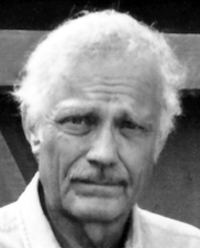Henry Chadwick Award: David Nemec
This article was written by Christina Kahrl
This article was published in Spring 2015 Baseball Research Journal
 Among the many avenues of curiosity for a baseball historian, perhaps none is more reliably arcane—even for SABR members—than the nineteenth century and the lessons it provides about the development of the game into a popular national pastime and a money-making enterprise. But among those happy few who have sought to dispel ignorance of the period and its importance, few rank as high or have earned as much recognition as SABR member DAVID NEMEC has.
Among the many avenues of curiosity for a baseball historian, perhaps none is more reliably arcane—even for SABR members—than the nineteenth century and the lessons it provides about the development of the game into a popular national pastime and a money-making enterprise. But among those happy few who have sought to dispel ignorance of the period and its importance, few rank as high or have earned as much recognition as SABR member DAVID NEMEC has.
A college ballplayer at Ohio State before he settled in California’s Bay Area in 1983, Nemec got started writing baseball trivia books in the 1970s. He moved on to writing a history of the game’s rules before starting to deliver his signature contributions in the ’90s: The Beer and Whisky League (about the major league American Association, 1882–91; 1994) and The Great Encyclopedia of Nineteenth Century Major League Baseball (1997), still cited as the definitive treatment of the subject even before it was expanded and republished in 2006.
In a sense, Nemec’s career as a historian was made possible not simply by a love for the game’s history, but the realization of how much had been left unwritten. Thinking back on the reference books available before the first Macmillan Baseball Encyclopedia was published in 1969, Nemec was inspired to fill in the blanks.
“I was caught irrevocably by the nineteenth century almost from the first moment I opened my copy of the original edition of Turkin and Thompson,” Nemec reflected. “Since no team rosters were provided, I soon began compiling my own of every team from 1871 to what was then 1951, I believe. Long before I finished I realized that I would be left with many gaps, particularly with the National Association clubs—positions unfilled, a shortage at certain positions with regard to the number of games played, etc. It became an ambition even then to fill those gaps, find first names for the many players listed only as a last name, uncover birth and death dates, etc. From that grew a larger ambition to one day write about my discoveries. What form that would take I still had no notion, nor did I until the early 2000s, when I acquired box scores for almost every 19c major league game. But as I went through them, things gradually began clicking into place.”
The culmination of his tireless pursuit and publication of information about the nineteenth century was his recent trilogy of books comprising biographies of every major league player, manager, principal owner, regular umpire, and league president prior to 1901. (The first two volumes, mostly on players, were published by Bison in 2011; the third, which added more umps and execs to the rolls, was a McFarland title in 2012.)
“The trilogy brought dimension to hundreds of figures that heretofore had only been ghostly wisps, some much fuller than others depending of what my research yielded,” Nemec said. “I regard all these bios as works in progress; there is still much to be learned of interest and significance about each of these ghosts. Since these books were published I have continued to expand my bios as new research emerges, and some of the results now appear on the SABR BioProject site.”
Nemec is quick to observe that SABR also played a significant, albeit brief, part in his original research: “My biggest break was SABR’s acquiring the usage of ProQuest material for one full year — before ProQuest pulled the rug upon discovering how many hits the site was getting each and every day from SABR members.”
Nemec’s contributions to baseball research far transcend any single category, more regularly aiming at entertaining baseball fans of any era. His interests have also ranged far beyond baseball, as he’s a playwright who also has eight novels and true crime nonfiction titles to his credit. But that creative breadth allowed Nemec the opportunity to create singular works like his nineteenth century baseball novel, Early Dreams (2004).
“Early Dreams paints a portrait not only of what it was like to be a struggling rookie player in the tumultuous 1884 season—the most interesting one in all of baseball history in my opinion—but also to serve as a prism through which life in 1880s America could be viewed,” Nemec said. “Indeed, baseball has always been an excellent prism in that respect. It was a treat to find a vehicle in which I could combine the two. … I started as a fiction writer and will probably end as one.”
Reflecting on his Chadwick-worthy career, Nemec observed, “I take great pleasure in breathing new life into nineteenth century research and resurrecting the many individuals who played key roles in the game’s early development, both on the field and off, but have never been given their due. …I’ll always be more drawn to the Sammy Vicks than to the Babe Ruths, and not only in baseball.”
To learn more about the Henry Chadwick Award, click here.


